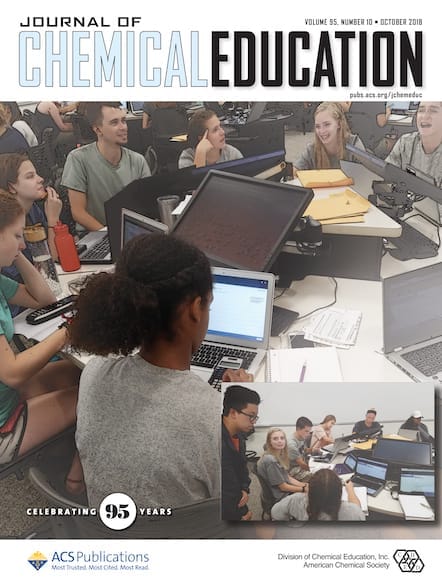On February 10, ACS Webinars hosted an interactive panel discussion on novel approaches, models, and pedagogies in chemistry to advance diversity, equity, inclusion, and respect (DEIR) efforts in academic and professional settings. Professor Leyte Winfield helped to organize this ACS Webinar, which was co-produced by ACS Publications and ACS Education. Professor Leyte Winfield is an Associate Professor […]

On February 10, ACS Webinars hosted an interactive panel discussion on novel approaches, models, and pedagogies in chemistry to advance diversity, equity, inclusion, and respect (DEIR) efforts in academic and professional settings. Professor Leyte Winfield helped to organize this ACS Webinar, which was co-produced by ACS Publications and ACS Education. Professor Leyte Winfield is an Associate Professor of Chemistry and Biochemistry and Division Chair for Natural Science and Mathematics at Spelman College. Professor Winfield and webinar moderator Professor Zakiya Wilson-Kennedy are also editors of the ACS Symposium Series eBook Growing Diverse STEM Communities: Methodology, Impact, and Evidence.
You can watch the webinar recording and download the webinar slides now.
Moderator and Presenters
The webinar was moderated by Professor Zakiya Wilson-Kennedy, Assistant Dean of Diversity & Inclusion in the College of Science and Associate Professor of Research in Chemistry Education at Louisiana State University.
It featured an expert panel of educational scholars and leaders, who are leading DEIR efforts and publishing their work on broadening participation efforts:
- Professor Anthony DePass, Co-Director, Understanding Interventions; Principal, DePass Academic Consulting; Professor of Biology, Long Island University
- Professor Lourdes Echegoyen, Research Assistant Professor, Chemistry and Biochemistry; Director, BUILDing SCHOLARS Center at University of Texas, El Paso
- Professor Michelle Claville, Assistant Dean and Professor of Chemistry, Hampton University; Program Director, NSF Undergraduate Programs
Creating an Inclusive, Resilient Future for Chemistry
The webinar focused on the growing problem of students leaving the chemistry enterprise and other STEM pathways at rates that have the potential to disrupt workforce stability. This departure is even more pronounced among women and ethnic and racial minorities, who are exiting at twice the rate of other student groups.
Panelists helped address what can be done to prevent this exodus and to create an inclusive, resilient future. An upcoming special issue in the Journal of Chemical Education on Diversity, Equity, Inclusion, and Respect in Chemistry Education Research and Practice will serve as a reference in this important topical area. Professors Wilson-Kennedy and Winfield are among the guest editors for this special issue.
The global audience tuning in to this webinar learned about the breadth of research that broadens the participation of individuals from groups underrepresented in STEM, including examples of DEIR initiatives that apply chemical education research and practice seeking to expand representation, engagement, and success.
Dr. Anthony DePass shared his perspective on the body of published and publishable work, as it relates to STEM professional development and STEM education. In particular, Understanding Interventions aims to leverage “hypothesis-based research to effect interventions and initiatives that broaden participation in science and engineering research careers.” Some of the organization’s work seeks to train practitioners, in this case educators, to be scholars so they may transform their observations into evidence-driven scholarship that promotes inclusion.
Dr. Lourdes Echegoyen described the BUILDing SCHOLARS program as a case study of the opportunities that contribute most to the success of University of Texas, El Paso, (UTEP) undergraduates in STEM disciplines. BUILDing SCHOLARS is a prestigious research-intensive, NIH-funded training program for students with a strong motivation to become researchers in biomedical, social, behavioral, or health sciences or biomedical engineering. The hallmarks Dr. Echegoyen and her colleagues identified as most closely indicative of student success include: persistence in studies, up to and including graduation; competitiveness in moving to the next career or education stage; and demonstrated excellence in research and scholarship.
The UTEP program has been successful at providing support and opportunities to a student population that is predominantly Hispanic, first-generation college students, and financially disadvantaged. Dr. Echegoyen closed with a thought-provoking quotation from activist Vernā Myers on the importance of action-oriented inclusion: “Diversity is being invited to the party. Inclusion is being asked to dance.”
Dr. Michelle Claville of Hampton University presented an overview of NanoHU, a program developed at the historically black research university, which engages students in cutting-edge opportunities associated with nanoscience. According to the program’s website, “the interdisciplinary program provides all of Hampton University’s undergraduate students with the opportunity to earn a minor in nanoscience as they prepare to meet the nation’s call for more inventive scientists and versatile engineers.”
The NanoHU model encompasses four key elements: education and training, research, professional development, and outreach and recruitment. The program has been successful in attracting student and faculty participation, producing research results and publications, securing research funding, and bringing new talent to the university. Overall, NanoHU successfully broadens participation and collaboration in nanoscience-based STEM initiatives.
This ACS webinar brought together the chemical education community representing a domestic & international audience. More than 80% of the webinar participants were affiliated with an academic institution, primarily in roles as researchers, instructors, or administrators. The webinar recording is now available for free, so that community members can learn more about the important topic of creating an inclusive and resilient future in chemistry education. Slides of this presentation are available via the webinar link as well.
